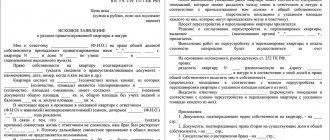Maxim Frolov
2.16k
Simple and accessible information about apartment privatization. Why do you need to privatize housing - The main stages and features of preparing documents and registering an agreement. General rules and costs, Advantages and disadvantages of privatization.
Until December 26, 1991, most citizens living on the territory of the USSR did not own their real estate, since it was essentially owned by the state.
After the USSR collapsed, a law was adopted that specified all the basic principles for the process of privatization of municipal and state housing stock for social use on the territory of the Russian Federation.
Now more than 80% of apartments in the country have already been transferred to privatized status. In this article we will understand what privatization of an apartment is, the necessary documents for it, who has the right to it, what is the tax on privatized housing, the price and how to privatize an apartment.
What is apartment privatization
Privatization of an apartment is a free Federal Law of February 22, 2021 No. 14-FZ “On invalidating certain provisions of legislative acts of the Russian Federation”, the transfer of real estate from state ownership to private ownership.
The program was launched in 1992. It was extended several times and finally made indefinite. It works like this. A person moves into an apartment that was allocated to him from the municipal or state housing stock, and becomes a kind of tenant. It’s just that he rents housing not from a private person, but from the authorities. And a person also pays for the use of real estate - only much lower than the commercial value. For example, in Moscow it is 26–29 Tariffs for housing and communal services for Moscow residents for 2021 / Department of Economic Policy and Development of the City of Moscow rubles per square meter, depending on proximity to the center. But the tenant does not dispose of the real estate, as well as a rented apartment.
In some cases (we’ll figure out which ones a little later), such housing can be privatized, that is, you can become its owner.
Exceptions
Despite the clear provisions of the legal act “On Privatization,” there are still ways to re-engage in this procedure.
| No. | Reasons for re-privatization |
| 1 | Privatization was carried out by a person before he reached the age of eighteen |
| 2 | The transfer of ownership of state property took place on a paid basis |
| 3 | Relocation of citizens from the regions of the Far North with the deprivatization of an apartment previously received from the state. However, even here there is an additional condition - if the apartment privatized there was given to someone as a gift or sold, then the right to reclaim ownership of the housing is lost. |
| 4 | Loss of previously privatized real estate due to man-made or natural disasters (flooding, the result of military operations or testing). There is also a condition that this apartment should not be transferred to third parties (sold, donated, etc.). |
| 5 | Availability of a court decision recognizing the contract for the transfer of an apartment to a private person as illegal and subject to cancellation |
To date, the legislator does not provide other grounds for re-transfer of possession of residential premises.
Why is apartment privatization necessary?
After privatization, the new owner can do whatever he wants with the property.
To sell, donate or mortgage an apartment
When real estate belongs to the state, this, of course, cannot be done.
To leave housing as an inheritance
And to anyone. If the apartment is not privatized, this cannot be done. After the death of the responsible tenant, that is, the person with whom the authorities entered into a rental agreement, the relatives of this person will not be kicked out onto the street. But only if they lived in the apartment and were registered in it at the time of the death of the previous tenant. In this case, the state will extend the agreement with one of the family members.
If one person was registered in the apartment and he died, the property will be returned to municipal ownership in order to transfer it to a new tenant.
To leave the apartment empty
For some reason, a person may need to go to another region and obtain temporary registration there. Or go on a long trip abroad - for example, to study for several years. Or for some other reason, leave the apartment for a long time.
The only problem that can arise with your own home is the layer of dust that has accumulated during your absence. But when living in a state apartment, the authorities may decide that the person does not really need this property, since he has not used it for so long.
To register anyone
Literally: you can register whoever you want in your apartment. In non-privatized there are restrictions. Only a minor child will be able to register without delay.
The spouse, adult children and parents will be prescribed by the Housing Code of the Russian Federation, Article 70 “The right of the tenant to move other citizens into the residential premises he occupies under a social tenancy agreement as members of his family” with the written consent of everyone who already lives in the apartment. For others, the same permits will be required, as well as the landlord's approval.
Who can privatize an apartment
Getting housing for free is an attractive idea. But for this you need to meet several criteria.
A person who lives in an apartment on social rent
Not every housing complex of the Russian Federation can rent real estate from the state, Article 49 “Provision of residential premises under a social tenancy agreement.” To do this, the person must be registered as needing housing. When the social rental agreement is concluded, you can think about privatization.
However, sometimes an apartment may turn out to be state-owned for another reason. For example, a person moved into housing during the Soviet era, but over the past years has not bothered with privatization. Such a tenant can also exercise his right.
Russian citizen
Everything is clear here: what is the point of distributing housing to foreigners if not all citizens of the country are provided with it.
A person with the right to privatization
Every Russian has the right to privatize housing one Law of the Russian Federation dated May 4, 1991 No. 1541‑1 “On the privatization of housing stock in the Russian Federation” times. An exception is made for those who participated in privatization when they were minors. Then, after 18, such a person has the right to claim another object.
Anyone who lives in an apartment under a social tenancy agreement can participate in privatization. In this case, an adult tenant may refuse privatization. Then it will retain its right for another object. But minor residents participate in privatization by default. Refusal is allowed only with the permission of the guardianship authorities.
Important: a person who refuses privatization receives the Federal Law of December 29, 2004 No. 189-FZ “On the Entry into Force of the Housing Code of the Russian Federation” the right to lifelong residence in an apartment, regardless of the wishes of the owner.
Participation procedure for the second time
The re-privatization procedure depends on whether it is paid or free of charge.
In fact, the law does not provide for paid privatization of housing, but a buyout takes place, which is carried out equally for all citizens, regardless of their category.
Free re-privatization is carried out for adults who participated as children in privatization, as well as those who deprivatized their housing through the courts and those who lost their housing as a result of an emergency, natural disaster, etc. in general order.
Resettlers from the Far North and former republics of the USSR must return their housing to the original owner, i.e. also deprivatize housing, before starting re-privatization.
What documents are needed to privatize an apartment?
It is better to find out the exact list of documents from the department that deals with privatization in your city. There is no general federal list. And in the regions they may ask for different papers. If you are interested, compare the requirements of Moscow Administrative regulations for the provision of public services of the city of Moscow “Privatization by citizens of residential premises of the housing stock of the city of Moscow” and St. Petersburg Order of the Housing Committee dated February 15, 2012 No. 106-r “On approval of the administrative regulations for the provision of public services ".
Here is a sample list for reference:
- Application for transfer of state-owned residential premises into ownership through privatization.
- Identification documents of the applicant and his family members who are registered with him in the apartment.
- Social tenancy agreement or order for privatized housing.
- Papers confirming citizenship.
- Written consent to privatization or refusal from residents registered in the apartment.
- Documents on family composition: certificates of marriage, birth of children.
- Certificates confirming that the right to privatization was not used. Usually you need to contact your local administration to obtain the document.
- Consent of parents or guardianship authorities if one of the future owners is a minor.
This list may expand depending on the circumstances and requirements of a particular department. Read the terms and conditions carefully and try to immediately collect all the necessary documents. Please note that some papers may have an expiration date.
What kind of housing can be registered as a property?
The basic requirements for re-registered real estate are as follows:
- The object must be owned by the state or municipality.
- The right to use real estate must be confirmed by a social tenancy agreement.
- The premises must comply with the norms and standards of construction and hygienic condition.
- The object should not be among those reserved by the state, part of protected lands or a military unit.
Advantages and disadvantages
In privatization, the positive aspects carry a lot of weight, otherwise the state program for free re-registration would not have become so widespread.
The main advantage is that after completion of the privatization process, the owner has the right to dispose of his living space at his own discretion. This is the main difference between owned premises and municipal housing.
The disadvantages of new owners are as follows:
- You will need to pay property taxes.
- You will need to pay utility bills for major repairs and maintenance of common areas.
- When moving out of a house in which there is a privatized apartment, the owner can only count on identical premises, i.e. no better, no worse. Apartments on social security for hire can be exchanged based on the principle of sufficiency of space for each registered person, i.e. the result may be a larger apartment with better conditions.
How to submit documents for privatization of an apartment
Documents are usually accepted by a body whose name includes property management - a city property management committee or something like that. But there are options. In St. Petersburg, for example, this is done by the privatization department of the St. Petersburg State Budgetary Institution “Gorzhilobmen”.
Papers can be brought directly to the department or submitted through the MFC. There is also a chance that the application will be accepted online. In St. Petersburg, you can send a document through the city government services portal, in Moscow - through the mayor’s website.
The decision on privatization must be made within a two-month period by the Law of the Russian Federation of July 4, 1991 No. 1541-1 “On the privatization of housing stock in the Russian Federation.” Based on the results of reviewing the documents, you will be given an agreement on the transfer of ownership of the apartment or will be refused with an explanation of the reasons.
The agreement must be signed by all participants in the privatization.
They can refuse only due to circumstances provided for by law. For example, you will be told that the premises cannot be privatized, since the house is recognized as unsafe. And in this case, it will be difficult to change anything. But if the matter is that the package of documents is incomplete, then you can submit the papers again.
Privatization – myths and reality
In the Russian Federation, the opportunity to transfer ownership of state or municipal housing has existed for two decades. Over the course of all these years, there has been talk more than once about the cessation of privatization, which gave rise to panic and excitement, which was used by agencies providing intermediary services in terms of assistance in collecting documents and submitting them to the registration authority.
At the moment, the state does not plan to cancel the program so that all citizens of the country have time to become property owners. Since 2021, changes have been made to the legislation that made the privatization of residential premises indefinite. Now, without rushing, you can collect the necessary certificates and persuade stubborn relatives to agree to the process, because everyone living in the apartment or house must agree.
Although the privatization law has changed, its main parts remain the same. Therefore, the existing information about the possibility of free re-privatization is pure myth. Having spent the opportunity given once, it will be extremely difficult to use the service a second time.
How to become an owner after privatization of an apartment
An apartment transfer agreement is not enough. The process will be completed when the right to transfer ownership is recorded by Rosreestr. To do this, you need to apply with the contract directly to the department or through the multifunctional center.
Registration is required by the Tax Code of the Russian Federation Article 333.18. The procedure and deadlines for paying the state duty is to pay a state duty of two thousand rubles.
If there are several participants in the privatization, the payment is divided equally between them. And each person must pay his part.
Is a privatized apartment a joint property?
Officially formalized marital relations create some nuances when privatizing an apartment. These nuances confuse citizens without legal training. Thus, according to the Law of the Russian Federation No. 1541-1, which we mentioned at the beginning, privatization is a free transaction. If a husband or wife privatizes an apartment in his own name, the housing will become his property. In the event of a divorce, a privatized apartment will not be divided equally, since it is not considered jointly acquired property. However, the former spouse can sue to recognize the housing as joint property if, during the marriage, he has invested money in it - for example, he has made repairs, redevelopment, reconstruction or something similar.
What to remember
- If you live in an apartment under a social tenancy agreement or received it from the state during the Soviet era, then you can privatize this property, that is, receive it for free.
- You can privatize housing once in your entire life. But if you participated in privatization when you were under 18 years old, then two.
- Everyone registered in the apartment must sign a consent to privatization or refusal of it. If someone hesitates, nothing will come of it.
- Minors participate in privatization by default. Refusal is possible only through the guardianship authorities.
- The most important thing in privatization is to collect a complete package of documents. The local administration body responsible for the process knows what papers will be needed.
How to properly register home ownership for the second time
The process of repeating the registration procedure does not depend on which time it is carried out, the algorithm is the same. The only difference is whether privatization will be paid or free. Registration of housing once is free of charge, but there is also the possibility of purchasing state property, which is available to anyone.
For the second time, it will be possible to re-register real estate as the property of persons who have reached the age of majority and those who have lost their property as a result of various types of disasters on a general basis.
If there is a desire to buy the premises from the state, then it does not matter whether the right to the free opportunity has been spent or not. In any case, permission is given to transfer into ownership not only the residential stock, but also the non-residential one.
Documentation
Collecting documentation does not take much time. Although with paid privatization you will need an expanded package of statements and certificates, since in most cases you have to participate in auctions.
For registration you will need to provide:
- rental agreement or social contract hiring;
- technical passport from the BTI and cadastral passport from the Cadastral Chamber;
- a statement expressing a desire to privatize a house, apartment, room;
- personal documents of employers - a passport, and spouses need a marriage certificate;
- an extract from the passport office or house register about registered people;
- personal account statement;
- certificates of absence of utility debts;
- certificate of non-participation in privatization from the BTI;
- extract from the Unified State Register obtained from Rosreestr.
Additionally, powers of attorney, waivers, and more are provided. They may be asked to provide them when submitting documents for registration.
Important! Certificates and statements have a certain validity period; you must take this fact into account and start collecting documents from those whose information is considered relevant longer.
Personal documents must be copied and submitted along with the originals. If the right to re-privatization is obtained, a Court decision will be required.
Cost of the procedure
According to the law, the housing privatization procedure is absolutely free once, but you need to know that there will be costs for paying government fees and collecting documents from various authorities.
- The state duty is 2000 rubles.
- Obtaining a certificate of non-participation in privatization before – approximately 200 rubles.
- The production of a technical passport can cost up to 20,000 rubles, it all depends on the urgency.
If you need to contact a notary to draw up a power of attorney, you will need to pay for his services; on average, this costs about 1,000 rubles. Writing a refusal also costs money.
Attention! If the procedure is performed for a minor who is the sole tenant of a residential premises and an orphan, then all costs are borne by the state or municipal government. However, you will still have to pay the state fee for registration.
Re-privatization on a paid basis involves payment of the cost of real estate. The municipality sets the price based on market or cadastral prices.








